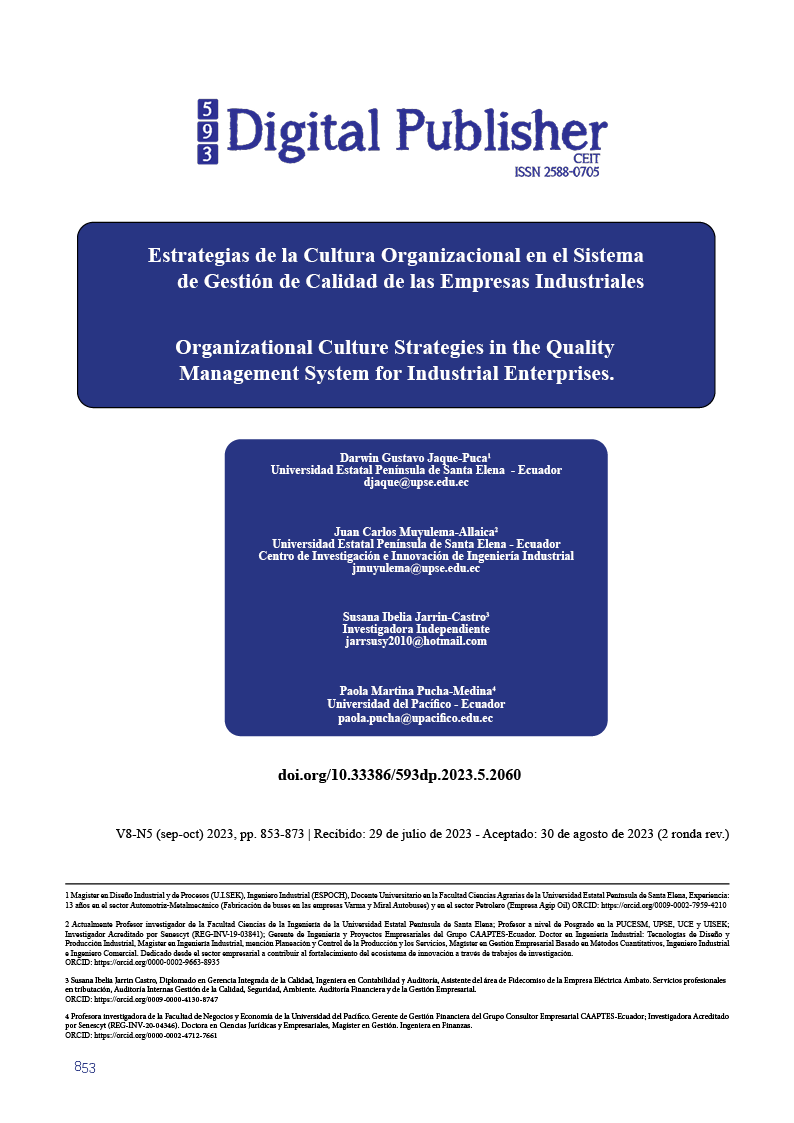Organizational Culture Strategies in the Quality Management System for Industrial Enterprises.
Main Article Content
Abstract
Understanding the characteristics of industrial companies and the environment in which they develop is essential, therefore organizational culture (OC) plays an important role due to its scope, in this sense it is becoming increasingly relevant in organizations that constantly experience changes in the environment. This study focuses on the strengthening of OC in the quality management system, which, supported by theories of several authors, in the executive decree 004 and in the ISO 9001-2015 Standard that allow designing strategies and management models of an OC that contributes to the fulfillment of business objectives. On the other hand, a situational study of industrial companies is carried out, through the application of surveys to collaborators, which resulted in that the OC is based on strategies, teamwork, leadership, commitment of people, customer focus, process approach, continuous improvement, relationship management, roles, responsibilities, authorities of the organization, communication of quality policy, values, and principles.
Downloads
Article Details

This work is licensed under a Creative Commons Attribution-NonCommercial-ShareAlike 4.0 International License.
1. Derechos de autor
Las obras que se publican en 593 Digital Publisher CEIT están sujetas a los siguientes términos:
1.1. 593 Digital Publisher CEIT, conserva los derechos patrimoniales (copyright) de las obras publicadas, favorece y permite la reutilización de las mismas bajo la licencia Licencia Creative Commons 4.0 de Reconocimiento-NoComercial-CompartirIgual 4.0, por lo cual se pueden copiar, usar, difundir, transmitir y exponer públicamente, siempre que:
1.1.a. Se cite la autoría y fuente original de su publicación (revista, editorial, URL).
1.1.b. No se usen para fines comerciales u onerosos.
1.1.c. Se mencione la existencia y especificaciones de esta licencia de uso.
References
AENOR. (2015). Sistema de gestion de la calidad ISO 9001. Madrid, España: AENOR.
Alonso, J. D. (21 de 06 de 2015). El Modelo de la Cultura Empresarial de Schein. Recuperado el 01 de 07 de 2020, de https://dbcalidad.blogspot.com/2015/06/el-modelo-de-la-cultura-empresarial-de.html
Asha, A. A., Dulal, M., & Habib, D. A. (2023). The influence of sustainable supply chain management, technology orientation, and organizational culture on the delivery product quality-customer satisfaction nexus. Cleaner Logistics and Supply Chain, 7. https://doi.org/10.1016/j.clscn.2023.100107
Assoratgoon, W., & Kantabutra, S. (2023). Toward a sustainability organizational culture model. Journal of Cleaner Production, 400, 136666. https://doi.org/10.1016/j.jclepro.2023.136666
Bejarano, M. A. (2017). La Cultura Organizacional, su importancia en el desarrollo de las empresas. INNOVA Research Journal, 110-113.
Canul, F. A. (06 de 11 de 2017). Un modelo adecuado para diagnosticar la Cultura Organizacional. Recuperado el 28 de 7 de 2022, de https://revistaic.instcamp.edu.mx/uploads/Ano2017No12/Ano2017No12_117_135.pdf
Chiavenato, I. (2019). Comportamiento organizacional La dinámica del éxito en las organizaciones. Mexico: Interamericana Editores, S.A. de C.V.
Decreto Ejecutivo 004. (24 de 05 de 2021). Recuperado el 28 de 06 de 2022, de https://www.correosdelecuador.gob.ec/wp-content/uploads/2021/07/Normas-de-Comportamiento-%C3%89tico-Gubernamental.pdf
Encalada, M. L. (2016). La cultura organizacional: eje de acción de la gestión humana. Samborondón, Ecuador: Universidad ECOTEC.
Eniola, A. A., Olorunleke, G. K., Akintimehin, O. O., Ojeka, J. D., & Oyetunji, B. (2019). The impact of organizational culture on total quality management in SMEs in Nigeria. In Heliyon (Vol. 5, Issue 8). Elsevier Ltd. https://doi.org/10.1016/j.heliyon.2019.e02293
Hardcopf, R., Liu, G. (Jason), & Shah, R. (2021). Lean production and operational performance: The influence of organizational culture. International Journal of Production Economics, 235. https://doi.org/10.1016/j.ijpe.2021.108060
Ketprapakorn, N., & Kantabutra, S. (2022). Toward an organizational theory of sustainability culture. In Sustainable Production and Consumption (Vol. 32, pp. 638–654). Elsevier B.V. https://doi.org/10.1016/j.spc.2022.05.020
Lam, L., Nguyen, P., Le, N., & Tran, K. (2021a). The relation among organizational culture, knowledge management, and innovation capability: Its implication for open innovation. Journal of Open Innovation: Technology, Market, and Complexity, 7(1), 1–16. https://doi.org/10.3390/joitmc7010066
Lam, L., Nguyen, P., Le, N., & Tran, K. (2021b). The relation among organizational culture, knowledge management, and innovation capability: Its implication for open innovation. Journal of Open Innovation: Technology, Market, and Complexity, 7(1), 1–16. https://doi.org/10.3390/joitmc7010066
Lapiņa, I., Kairiša, I., & Aramina, D. (2015). Role of Organizational Culture in the Quality Management of University. Procedia - Social and Behavioral Sciences, 213, 770–774. https://doi.org/10.1016/j.sbspro.2015.11.472
Liu, G., Tsui, E., & Kianto, A. (2021). Knowledge-friendly organisational culture and performance: A meta-analysis. Journal of Business Research, 134, 738–753. https://doi.org/10.1016/j.jbusres.2021.05.048
Ma, C., & Cheok, M. Y. (2022). The impact of financing role and organizational culture in small and medium enterprises: Developing business strategies for economic recovery. Economic Analysis and Policy, 75, 26–38. https://doi.org/10.1016/J.EAP.2022.04.009
Méndez, D. M. (2018). La cultura organizacional, elementos generales, mediaciones e impacto en el desarrollo integral de las instituciones. Pensamiento & Gestión, 12.
Mendoza, R. L., & Sotomayor, V. M. (2020). Las PYMES en Ecuador. Un análisis necesario. Digital Publisher, 192.
Mikušová, M., Klabusayová, N., & Meier, V. (2023). Evaluation of organisational culture dimensions and their change due to the pandemic. Evaluation and Program Planning, 97. https://doi.org/10.1016/j.evalprogplan.2023.102246
Miral Autobuses. (2022). Miral Autobuses. Obtenido de http://www.miral-autobuses.com/productos.html
Navarro, V. A. (2017). Desarrollo de un Modelo de Diagnóstico de Cultura Organizacional. Recuperado el 29 de 07 de 2022, de http://www.scielo.org.bo/pdf/rp/n39/n39_a04.pdf
Patiño, V. P., Cacima, A. J., Camejo, L. C., Roque, Y. V., & Roque, Y. V. (02 de 05 de 2021). Impacto de la COVID-19 para el desarrollo de la cultura organizacional. Panorama Cuba y Salud 2021.
Pedraza-Rodríguez, J. A., Ruiz-Vélez, A., Sánchez-Rodríguez, M. I., & Fernández-Esquinas, M. (2023). Management skills and organizational culture as sources of innovation for firms in peripheral regions. Technological Forecasting and Social Change, 191. https://doi.org/10.1016/j.techfore.2023.122518
Rass, L., Treur, J., Kucharska, W., & Wiewiora, A. (2023). Adaptive dynamical systems modelling of transformational organizational change with focus on organizational culture and organizational learning. Cognitive Systems Research, 79, 85–108. https://doi.org/10.1016/j.cogsys.2023.01.004
Shi, G., & Shiichiro, I. (2012). Study on the strategies for developing a safety culture in industrial organizations. Procedia Engineering, 43, 535–541. https://doi.org/10.1016/j.proeng.2012.08.093
Sierra, E. R. (2018). El concepto de estrategia como fundamento de la planeación estratégica. Barranquilla, Colombia: Universidad del Norte.
Sordo, A. I. (2021). Cultura organizacional: tipos, elementos y ejemplos extraordinarios. Recuperado el 12 de 07 de 2022, de https://blog.hubspot.es/marketing/cultura-organizacional
Thelen, P. D., & Formanchuk, A. (2022). Culture and internal communication in Chile: Linking ethical organizational culture, transparent communication, and employee advocacy. Public Relations Review, 48(1). https://doi.org/10.1016/j.pubrev.2021.102137
Vargas, J. A. (2018). Implementación del Ciclo de Deming para mejorar la productividad en el área de mantenimiento de bombas centrífugas en la empresa metalmecánica Recolsa S.A, Callao 2017. Tesis de Ingeniería, Perú.
Vesga, J. J., & Rubiano, M. G. (2020). Cultura organizacional y cambio: reflexiones y discusiones desde la psicología organizacional. Bogotá: Universidad Católica de Colombia.





